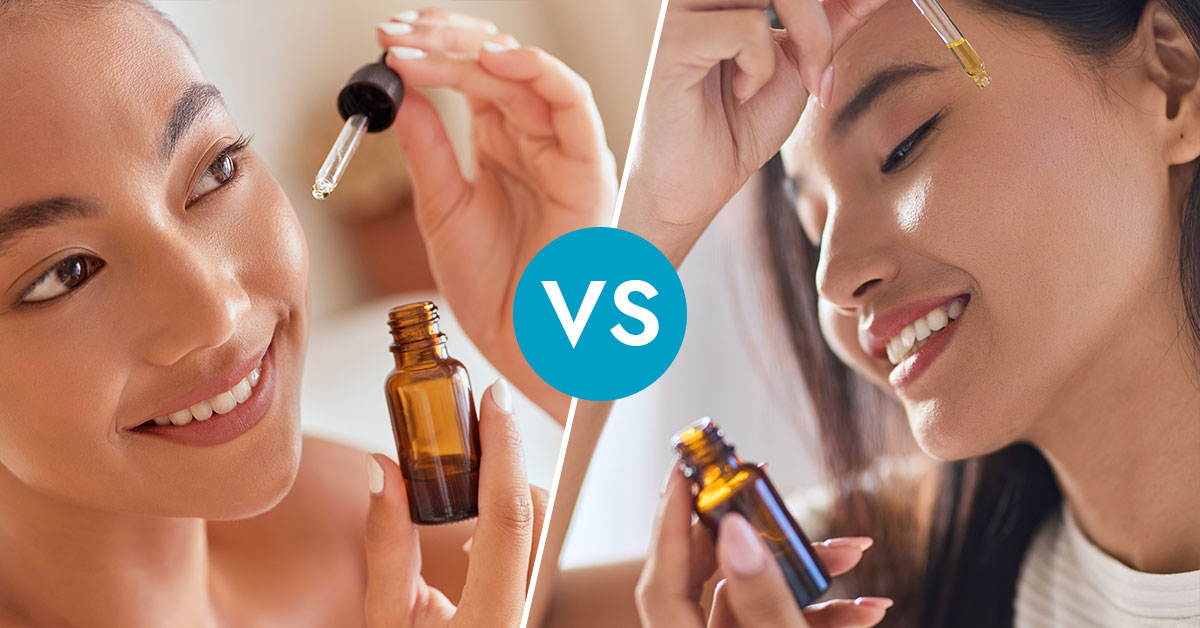Retinol vs. Retinoids: What’s the Difference and Which Should You Use?

If you’ve ever come across the terms “retinol” and “retinoids,” you’re not alone in wondering what they mean and how they differ. These ingredients are often praised for their transformative effects on skin, but choosing the right one depends on your specific needs and skin type. Let’s break it all down in a way that’s easy to understand.
What’s Inside
- What Is Retinol?
- What Are Retinoids?
- Key Differences Between Retinol and Retinoids
- Benefits of Retinol and Retinoids
- Which One Should You Use?
- How to Use Retinol and Retinoids Safely
What Is Retinol?
Retinol is a specific type of retinoid, and is typically available over the counter. It’s used as an entry-level option for people who are new to vitamin A products. Once applied to the skin, retinol is converted into retinaldehyde and then into retinoic acid, which is the active form that delivers results.
Because this conversion process takes time, retinol works more slowly compared to stronger, prescription-strength retinoids. The upside? It’s gentler and less likely to cause irritation, making it ideal for people with sensitive or dry skin.
Related: What is Retinol? Understanding Its Anti-Aging Benefits
What Are Retinoids?
Retinoids are a class of vitamin A derivatives that are widely used in skincare for their ability to improve skin texture, reduce signs of aging, and treat acne. Think of “retinoids” as the umbrella term for all vitamin A derivatives, which include:
- Retinol
- Retinaldehyde
- Tretinoin (prescription-strength)
- Adapalene (found in both over-the-counter and prescription options)
- Isotretinoin (commonly prescribed for severe acne)
Retinoids work by speeding up cell turnover and boosting collagen production. This helps improve skin tone, texture, and elasticity while also unclogging pores and reducing acne.
Key Differences Between Retinol and Retinoids
So, what sets these two apart? Let’s look at the main distinctions:
1. Strength
Retinoids are generally more potent than retinol. Prescription-strength retinoids like adapalene are highly concentrated and work faster in treating acne. Retinol, on the other hand, is less potent and takes longer to show visible results, and is advised to be used gradually.
2. Availability
Retinol is available over the counter, making it accessible for most people. Retinoids, especially prescription-strength options, require a doctor’s approval. Some exceptions, like adapalene (found in Differin gel), are available OTC.
3. Skin Sensitivity
Retinol is less likely to cause side effects such as redness, peeling, and dryness. Retinoids, particularly stronger ones, can be harsh on the skin, especially for beginners.
However, retinol can still cause irritation if not used properly. For example, using too much too quickly, mixing it with the wrong active ingredients, or skipping gradual introduction can lead to skin issues—so it’s important to ease into it!
4. Speed of Results
Retinoids work faster due to their higher potency. Retinol takes longer to deliver noticeable changes but offers a gentler experience overall.
Benefits of Retinol and Retinoids
Both retinol and retinoids offer impressive benefits, but the key is choosing the right one for your needs.
Benefits of Retinol:
- Improves skin texture and tone over time
- Reduces the appearance of fine lines and wrinkles
- Minimizes pores and smooths skin
- Gentle enough for most skin types
Benefits of Retinoids:
- Treats moderate to severe acne effectively
- Reduces deep wrinkles and sun damage
- Speeds up cell turnover for faster results
- Helps fade hyperpigmentation and dark spots
Which One Should You Use?
Choosing between retinol and retinoids depends on your skin concerns, sensitivity level, and how experienced you are with vitamin A products.
If You’re New to Vitamin A:
Start with retinol. Its gentler nature makes it perfect for beginners. Look for products with a concentration between 0.25% to 1%. It’s best to use it once a week for one week, then increase to twice a week for two weeks, gradually working your way to increasing frequency as your skin builds tolerance.
For Acne-Prone Skin:
If over-the-counter options aren’t enough to manage your acne, consider retinoids like adapalene or tretinoin. These are more effective at unclogging pores and preventing future breakouts. Consult a dermatologist for prescription options if needed.
For Anti-Aging:
Both retinol and retinoids can reduce signs of aging, but retinoids provide faster and more dramatic results. If you’re dealing with significant sun damage or deep wrinkles, a prescription-strength retinoid might be the way to go.
Related: 12 Best Skin Care Ingredients for Anti-Aging
For Sensitive Skin:
Stick with retinol or retinaldehyde, as they’re less likely to irritate. Pair your product with a hydrating moisturizer to keep your skin barrier healthy.
How to Use Retinol and Retinoids Safely
Regardless of which option you choose, proper usage is essential to avoid irritation and maximize results. Here are some tips:
1. Start Slow
Use retinol or retinoids only 1-2 times a week when starting out. As your skin adapts, you can increase usage to every other night or daily if tolerated.
2. Use at Night
Both retinol and retinoids can make your skin more sensitive to sunlight. Apply them in your nighttime routine and always wear sunscreen during the day.
3. Moisturize
To minimize dryness or peeling, apply a moisturizer after your retinol or retinoid. You can even use the “sandwich method,” where you moisturize before and after applying the retinol or retinoid.
4. Avoid Mixing With Certain Ingredients
Avoid combining retinol or retinoids with harsh exfoliants or strong active ingredients like benzoyl peroxide or vitamin C in the same routine. This can cause irritation.
Related: Skin Care 101: What Skincare Ingredients Shouldn’t Be Mixed Together?
5. Be Patient
Results take time. For retinol, you may see improvements in 12 weeks or longer. Prescription retinoids may show changes in 6-8 weeks, but full results can take months.
Are you looking for Skincare Products in the Philippines? Visit our page! We have a variety of items for you to browse! Like our Facebook page for updates!
